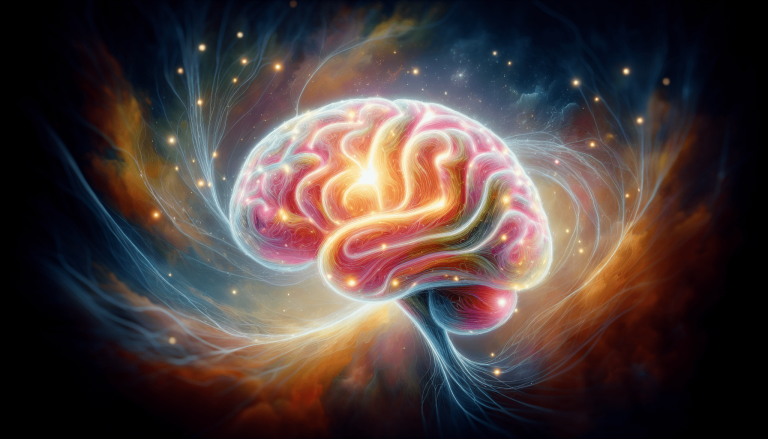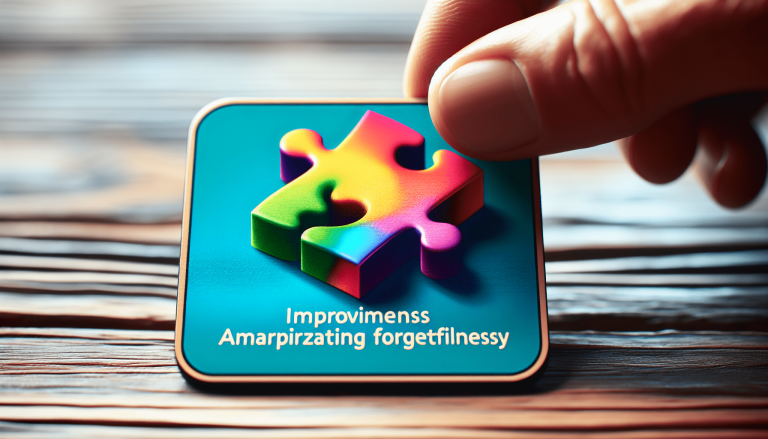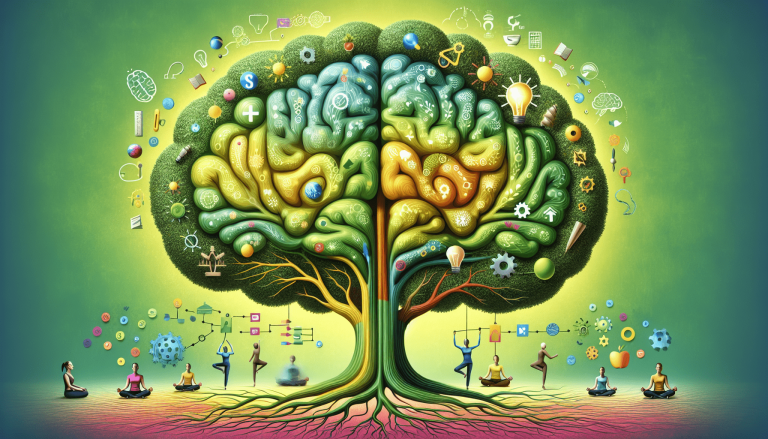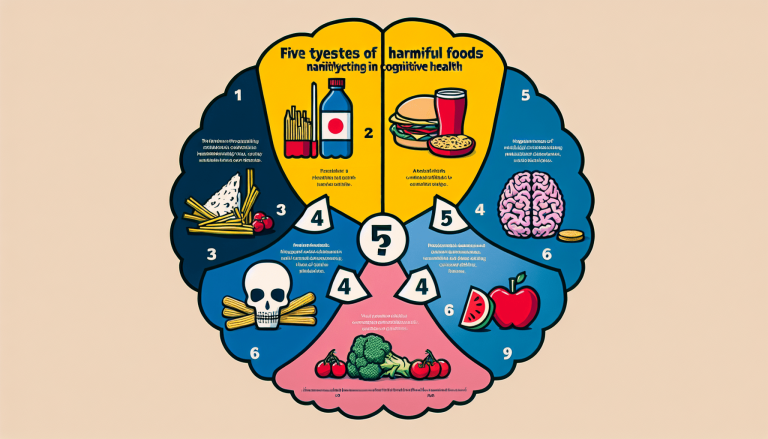What Improves Brain Function The Most?
Have you ever wondered what activities or habits have the greatest impact on enhancing your brain function? In this article, we explore the fascinating world of neuroplasticity and uncover the key factors that contribute to improving brain function. From physical exercise to engaging in mental challenges, we delve into the various strategies that can help boost your cognitive abilities and optimize your brain’s performance. Whether you’re seeking to sharpen your memory, enhance your creativity, or simply maintain a healthy brain, understanding what truly improves brain function is essential. Join us on this enlightening journey as we uncover the secrets to optimizing your brain’s potential.

1. Physical Exercise
Aerobic Exercise
Engaging in regular aerobic exercise is one of the best things you can do to improve your brain function. When you participate in activities such as running, swimming, or cycling, your heart rate increases, pumping more oxygen and nutrients to your brain. This increased blood flow promotes the growth of new brain cells and enhances the connectivity between existing ones. Additionally, aerobic exercise has been found to improve memory, attention, and cognitive flexibility. So, grab your running shoes or jump in the pool, and get your heart pumping for a healthier brain!
Strength Training
While many people associate strength training solely with building muscle and improving physical strength, it also has significant benefits for your brain. When you engage in resistance exercises like weightlifting or bodyweight workouts, you challenge your muscles and bones, triggering the release of growth factors that enhance brain cell function. Strength training also increases the production of certain proteins that support the growth of new neurons and improve cognitive performance. So, don’t underestimate the power of lifting weights or doing bodyweight exercises – they can do wonders for your brain!
Yoga and Tai Chi
In addition to aerobic exercise and strength training, practices like yoga and Tai Chi offer unique benefits for brain function. These mind-body disciplines incorporate physical movements, breathing exercises, and mindfulness, all of which have been linked to improved cognitive abilities. Yoga, for instance, helps reduce stress and anxiety, while enhancing focus and promoting relaxation. On the other hand, Tai Chi combines slow and controlled movements with deep breathing, which not only improves physical balance and coordination but also enhances mental clarity and attention. So, consider adding yoga or Tai Chi to your exercise routine for a holistic boost to your brain health.
2. Mental Stimulation
Reading
If you want to keep your brain sharp and improve cognitive function, reading is a fantastic activity to engage in regularly. Whether you enjoy fiction or non-fiction, reading exercises your brain by requiring you to engage with the content, understand complex ideas, and visualize descriptions. It stimulates various regions of the brain, such as those responsible for language processing, memory, and attention. Furthermore, reading can boost creativity, expand your vocabulary, and improve critical thinking skills. So, grab a book, immerse yourself in a compelling story or learn something new, and give your brain the workout it craves!
Puzzles and Games
Puzzles and games offer an enjoyable way to challenge your brain and maintain its function. Activities like crossword puzzles, Sudoku, chess, and brainteasers help improve problem-solving skills, memory, and cognitive flexibility. They require you to think creatively, make decisions, and strategize, thus stimulating different areas of your brain. Moreover, puzzles and games can be a fun and social activity, allowing you to engage with others and receive the additional benefits of social interaction. So, set aside some time each day to tackle a puzzle or play a game, and give your brain the mental stimulation it needs.
Learning a New Skill
Learning a new skill is not only a great way to broaden your horizons and challenge yourself, but it also has remarkable benefits for your brain. When you engage in the process of learning, whether it’s playing a musical instrument, painting, or mastering a new language, you activate multiple areas of your brain and promote neuroplasticity – the brain’s ability to form new connections and reorganize itself. This not only enhances cognitive abilities but also improves memory and attention. So, prioritize lifelong learning, pick up a new hobby or skill, and watch your brain thrive!
3. Healthy Diet
Omega-3 Fatty Acids
Including omega-3 fatty acids in your diet is crucial for promoting optimal brain function. These essential fatty acids, commonly found in fatty fish like salmon, trout, and sardines, as well as walnuts and flaxseeds, play a vital role in brain development and function. They help maintain the structure and integrity of brain cells, support communication between neurons, and reduce inflammation in the brain. Additionally, omega-3 fatty acids have been associated with improved cognitive performance, memory, and mood. So, be sure to include these brain-boosting nutrients in your meals to nourish your brain.
Antioxidant-Rich Foods
Consuming a diet rich in antioxidants is another way to enhance brain function and protect against cognitive decline. Antioxidants are compounds that help combat oxidative stress, a process that damages cells, including those in the brain. Fruits and vegetables such as berries, spinach, kale, and broccoli are excellent sources of antioxidants. They contain vitamins, minerals, and phytochemicals that reduce inflammation, promote proper blood flow to the brain, and support overall brain health. So, load up your plate with vibrant, antioxidant-rich foods and give your brain a nourishing boost.
Brain-Boosting Supplements
In addition to a healthy diet, certain supplements can provide an extra edge when it comes to boosting brain function. Supplements like fish oil, which contains omega-3 fatty acids, and curcumin, derived from turmeric, have been shown to enhance memory, improve attention, and reduce inflammation in the brain. Other supplements such as ginkgo biloba and Bacopa monnieri have been associated with improved cognitive performance and memory recall. However, it’s important to consult with a healthcare professional before starting any new supplement regimen to ensure they are appropriate for you and won’t interact with any medications you may be taking. So, consider incorporating brain-boosting supplements into your routine after consulting with a healthcare professional.
4. Quality Sleep
Sleep Hygiene
Getting an adequate amount of quality sleep is essential for optimal brain function. Sleep plays a crucial role in memory consolidation, learning, and overall cognitive performance. To improve the quality of your sleep, it’s important to practice good sleep hygiene. This involves establishing a relaxing bedtime routine, keeping your sleep environment dark, quiet, and comfortable, and avoiding stimulating activities and electronic devices before bed. Additionally, maintaining a consistent sleep schedule and creating a sleep-friendly environment can help regulate your body’s internal clock, ensuring you get a restful night’s sleep and wake up feeling refreshed.
Napping
In addition to getting a good night’s sleep, incorporating short naps into your day can provide a quick cognitive boost. Research has shown that napping can improve memory, creativity, and problem-solving skills. However, it’s important to keep naps short (around 20-30 minutes) and avoid napping too close to bedtime, as longer or late afternoon naps can interfere with nighttime sleep. So, if you find yourself feeling a bit sluggish during the day, taking a short power nap can be a convenient and effective way to recharge your brain.
Deep Sleep Stages
One of the most important aspects of quality sleep is ensuring that you spend enough time in the deep sleep stages. During deep sleep, the brain consolidates memories, processes emotions, and repairs and rejuvenates tissues. By prioritizing strategies that support deep sleep, such as maintaining a consistent sleep schedule, creating a peaceful sleep environment, and practicing relaxation techniques before bed, you can optimize your brain’s ability to function at its best. So, make sure you’re giving your brain the opportunity for restful and restorative deep sleep to enhance overall brain function.

5. Stress Management
Meditation and Mindfulness
Chronic stress can have detrimental effects on brain function, impairing memory, attention, and decision-making abilities. Therefore, it’s vital to incorporate stress management techniques into your daily routine. Meditation and mindfulness practices are powerful tools for reducing stress and improving brain function. By focusing your attention and quieting your mind, meditation promotes a state of relaxation and reduces the release of stress hormones. Additionally, mindfulness cultivates present moment awareness, allowing you to better manage stress and enhance cognitive abilities. So, set aside a few minutes each day to practice meditation or engage in mindfulness exercises, and give your brain the calm and clarity it needs.
Yoga and Relaxation Techniques
Engaging in regular yoga practice can be a wonderful way to reduce stress and improve brain function. Yoga combines physical postures, deep breathing, and relaxation techniques, which have been shown to decrease anxiety, lower stress levels, and improve overall well-being. The physical movements in yoga increase blood flow to the brain, providing it with oxygen and nutrients, while the relaxation techniques help activate the parasympathetic nervous system, promoting feelings of relaxation and calm. So, roll out your yoga mat, strike a pose, and give your brain the stress relief it deserves.
Social Support
Having a strong social support system is not only important for maintaining emotional well-being, but it also plays a crucial role in brain health. Connecting with friends and loved ones can provide a sense of belonging, reduce feelings of stress and loneliness, and enhance cognitive function. Engaging in social activities and maintaining positive relationships stimulates the brain’s reward system, releasing feel-good chemicals that improve mood and overall mental well-being. So, make it a priority to nurture your relationships, spend time with loved ones, and enjoy the positive impact it has on your brain.
6. Social Interaction
Socializing with Friends and Family
Spending time with friends and family is an essential aspect of maintaining a healthy brain. Engaging in meaningful social interactions stimulates various regions of the brain, enhancing cognitive skills such as attention, memory, and problem-solving. It also promotes emotional well-being, reduces stress levels, and improves overall brain health. Whether it’s having a conversation, sharing a meal, or participating in group activities, making time for socializing with loved ones is a wonderful way to keep your brain active and functioning at its best.
Support Groups
Joining a support group or participating in group therapy can be incredibly beneficial for brain function, especially if you’re dealing with challenging life circumstances or mental health issues. Support groups provide a safe space to connect with others who can relate to your experiences, share advice, and provide emotional support. This sense of belonging and social support can enhance overall well-being, reduce stress, and improve cognitive functioning. So, if you’re facing difficulties, consider seeking out a support group that aligns with your needs and give your brain the support it needs.
Volunteering
Engaging in volunteer work not only benefits others, but it also has significant positive effects on your own brain health. Volunteering allows you to connect with your community, promote social interactions, and establish a sense of purpose and fulfillment. These activities stimulate various brain regions involved in empathy, compassion, and social cognition, improving overall cognitive function and emotional well-being. Whether it’s helping out at a local charity, mentoring someone in need, or participating in community events, finding ways to give back can have a profound impact on your brain.
7. Brain-Training Apps and Tools
Lumosity
Lumosity is a popular brain-training app designed to improve cognitive abilities such as memory, attention, and problem-solving skills. Through a series of engaging games and activities, Lumosity targets specific cognitive domains and adapts to your performance, challenging you at the right level. The app provides personalized training programs tailored to your goals and tracks your progress over time. Whether you’re seeking to boost your memory or enhance your mental flexibility, Lumosity offers a fun and convenient way to exercise your brain.
Elevate
Elevate is another brain-training app that focuses on enhancing various cognitive skills, including reading comprehension, mathematical reasoning, and processing speed. The app offers personalized daily workouts that adapt based on your performance and target specific areas of improvement. Elevate also provides detailed feedback and performance tracking, allowing you to monitor your progress and measure your cognitive growth. With its sleek interface and wide range of carefully designed games and exercises, Elevate is a valuable tool for improving brain function.
NeuroNation
Ideal for those looking to boost their brain power through scientifically validated exercises, NeuroNation offers a comprehensive brain-training program. The app offers a variety of exercises focused on areas such as memory, attention, and logical reasoning. It tracks your progress, provides detailed feedback, and adapts the difficulty of the exercises to challenge your brain effectively. NeuroNation also offers personalized training programs and tips to help you maximize your cognitive potential. With its evidence-based approach and user-friendly interface, NeuroNation is a valuable tool for anyone seeking to improve their brain function.
8. Cognitive Behavioral Therapy
Understanding and Reshaping Thought Patterns
Cognitive Behavioral Therapy (CBT) is a well-established therapeutic approach that focuses on understanding and reshaping thought patterns to improve mental well-being and cognitive function. By identifying negative or distorted thinking patterns, CBT helps individuals challenge and replace these thoughts with more rational and positive ones. This process can lead to improved cognitive abilities, including memory, attention, and problem-solving skills. CBT can be effective in managing various conditions such as anxiety, depression, and stress, making it a valuable tool for enhancing brain function.
Developing Coping Strategies
CBT also helps individuals develop effective coping strategies to manage challenging situations and emotions. By learning healthy coping mechanisms, such as relaxation techniques, problem-solving skills, and stress management strategies, individuals can better regulate their emotions and reduce stress levels. This, in turn, improves cognitive function and enhances overall brain health. Whether you’re experiencing daily stressors or dealing with more severe mental health issues, CBT can provide you with valuable tools to navigate life’s challenges and optimize your brain’s performance.
Behavior Modification
Another key aspect of CBT is behavior modification, which involves identifying and changing behaviors that contribute to cognitive difficulties or mental health issues. By targeting maladaptive behaviors and replacing them with healthier alternatives, CBT can promote positive changes in cognitive function. For example, if procrastination is interfering with productivity and cognitive performance, CBT can help individuals develop strategies to overcome this behavior, such as time management techniques and setting achievable goals. By modifying behaviors that hinder cognitive function, CBT empowers individuals to optimize their brain’s potential.
9. Brain-Enhancing Supplements
Ginkgo Biloba
Ginkgo Biloba is a herbal supplement derived from the leaves of the Ginkgo biloba tree. It has been traditionally used in Chinese medicine and has gained popularity as a brain-enhancing supplement. Ginkgo Biloba is believed to improve brain function by increasing blood flow, reducing inflammation, and acting as an antioxidant in the brain. Several studies have suggested that Ginkgo Biloba may enhance cognitive performance, memory, and attention in both healthy individuals and those with cognitive impairments. However, it’s important to consult with a healthcare professional before adding Ginkgo Biloba or any other supplement to your routine.
Bacopa Monnieri
Bacopa Monnieri is an herbal supplement derived from the plant Bacopa monnieri, also known as water hyssop. It has a long history of use in Ayurvedic medicine and is believed to enhance memory and cognitive function. Research suggests that Bacopa Monnieri may improve memory, focus, and information processing speed. It is thought to work by increasing levels of certain neurotransmitters in the brain, promoting neuron communication, and reducing oxidative stress. As with any supplement, it’s important to consult with a healthcare professional before incorporating Bacopa Monnieri into your routine.
Acetyl-L-Carnitine
Acetyl-L-Carnitine (ALCAR) is a naturally occurring compound that plays a crucial role in energy metabolism. It is also available as a supplement and has been studied for its potential benefits on brain function. ALCAR is believed to support brain health by enhancing energy production in brain cells, promoting the synthesis of neurotransmitters, and protecting against oxidative stress. Research suggests that ALCAR may improve memory, attention, and overall cognitive function, particularly in older individuals. However, it’s important to note that individual responses to supplements may vary, and it’s always best to consult with a healthcare professional before introducing any new supplement.
10. Brain-Boosting Medications
Modafinil
Modafinil is a prescription medication that has gained attention for its potential to enhance cognitive function. It is commonly used to treat narcolepsy and other sleep-related disorders. Modafinil works by increasing wakefulness and alertness, thereby improving cognitive performance. It has been shown to enhance memory, attention, and executive functions in individuals with sleep deprivation and certain medical conditions. However, it’s important to note that Modafinil is a prescription medication with potential side effects, and its use should always be discussed with a healthcare professional.
Donepezil
Donepezil is a medication approved for the treatment of Alzheimer’s disease and other forms of dementia. It belongs to a class of drugs called cholinesterase inhibitors, which work by increasing the levels of certain neurotransmitters in the brain. Donepezil is believed to improve cognitive function and slow down the progression of memory loss in individuals with Alzheimer’s disease. While its primary use is for dementia, some research suggests that Donepezil may also have beneficial effects on cognitive function in healthy individuals. As with any medication, it’s important to discuss the potential benefits and risks with a healthcare professional.
Rivastigmine
Rivastigmine is another cholinesterase inhibitor medication used for the treatment of Alzheimer’s disease and dementia. Similar to Donepezil, Rivastigmine works by increasing the levels of certain neurotransmitters in the brain, which can improve cognitive function and slow down the progression of memory decline. While primarily used for dementia, Rivastigmine may also have potential benefits for healthy individuals. However, as with any medication, it’s important to consult with a healthcare professional to determine if Rivastigmine is appropriate for your specific circumstances.
In conclusion, there are numerous ways you can improve brain function and enhance cognitive abilities. Engaging in regular physical exercise, such as aerobic exercise, strength training, and practices like yoga and Tai Chi, promotes optimal brain health. Mental stimulation through activities like reading, puzzles and games, and learning new skills is also crucial for brain function. A healthy diet rich in omega-3 fatty acids, antioxidant-rich foods, and brain-boosting supplements nourishes the brain. Quality sleep, stress management techniques like meditation and mindfulness, and social interaction are essential for brain health. Brain-training apps and tools, cognitive behavioral therapy, brain-enhancing supplements, and certain medications can also support cognitive function. By incorporating these strategies into your daily routine, you can unleash the full potential of your brain and enjoy improved cognitive abilities throughout your life. Remember, it’s never too late to start taking care of your brain – so why not start today?
Additional Resources

This is absolutely insane!
My heart froze as I watched this video explaining how these brilliant scientists managed to revoke Alzheimer, dementia and 3 other types of brain diseases in 100% of cases. It was the biggest trial ever run on 7,000 people, from mild to severe memory loss disease. You can check their findings here.
It took them 4 years and a lot of sweat and blood but in the end they actually discovered the real root cause of brain damage and why diseases like Alzheimer and dementia happen to millions these days.







